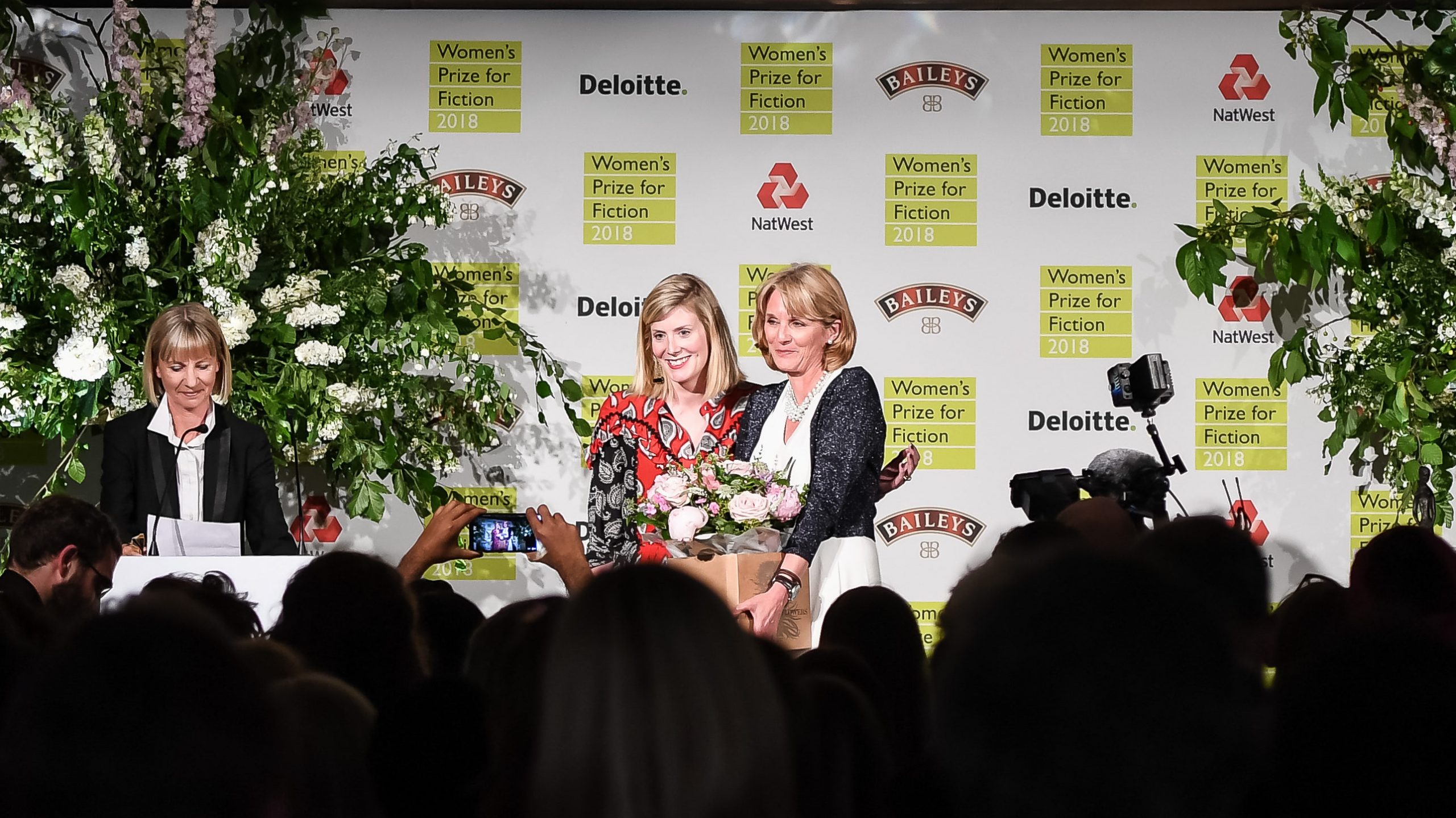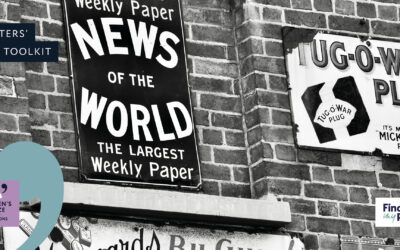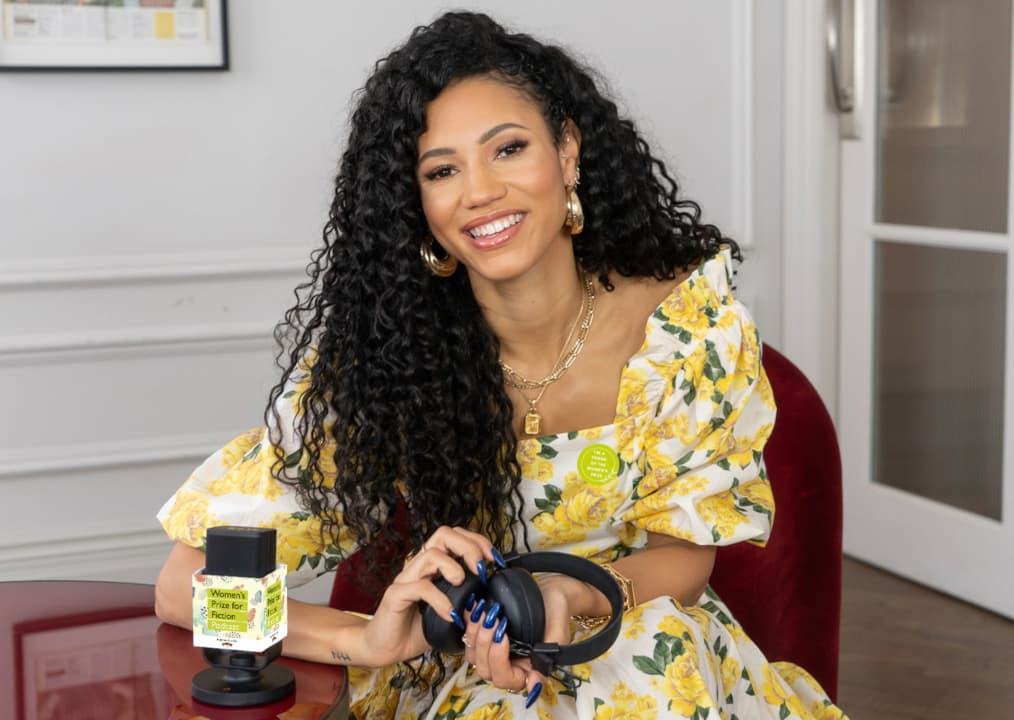
How to pitch your novel
Preparing to Pitch: The novelist salesperson “Can you summarise your novel in a sentence or two,” my marketer, Eloise asks,…


The Women’s Prize x Grazia First Chapter competition ran for 12 years and has now been discontinued, with 2022 being the last year the competition was run. We keep an archive of past winners and runners-up to inspire future writers to tell their stories. Scroll on to read the 2018 entry that stunned the judges and participating author Paula Hawkins. Feeling inspired? You can enter our Discoveries programme for emerging writers. Learn more here.
At the 2018 Women’s Prize awards party, Faith Eckersall was crowned the winner of the 2018 Grazia and Women’s Prize for Fiction First Chapter competition. 53-year-old Faith was presented with her award and had her talent flagged up to some of the biggest names in the industry, plus her short story printed in the pages of Grazia.
Bestselling author of The Girl on the Train Paula Hawkins helped us in our quest to find a new female writing star, writing the opening paragraph of a story called The Favourite Child – and the entrants were challenged to finish the first chapter.
How Paula Hawkins got the story started…
Of Katherine’s four children, her second-born, Lauren, was undoubtedly her favourite. Cara, the eldest, was wilful and disobedient, while the two youngest, Robert and Alex, were as feeble and timorous as their father. Lauren was dutiful without being sycophantic, obliging without being needy. She never entered Katherine’s bedroom without knocking and, when she was invited in, she frequently brought with her curious gifts: snails from the garden, or a perfectly-round pebble or, on one occasion, the bones and beak of a bird which, cat-like, she laid at the foot of her mother’s bed.
How Faith Eckersall, our winner, continued it…
None of this had particularly troubled her mother. Katherine had been very similar as a child herself, bringing what her own mother had described as ‘Kathy’s treasures’ – an old, golden powder compact or a broken robin’s egg, delicate and blue, like a baby’s painted fingernail.
So when Lauren appeared with her latest find, Katherine’s response was generally: ‘Beautiful, darling.’ Lauren would nod. No fuss. Almost as if she understood.
Cara found the whole thing ridiculous and never lost an opportunity to say so. ‘Oh God, Lauren, not more crap!’ she’d sigh. The boys seemed puzzled by her.
It suited Katherine. She loved her children, she supposed, but with the exception of Lauren they bored her.
She remembered the day she’d first realised this, sitting at a toddler group with Cara, as the child alternately went rigid and then flung herself on the floor because she didn’t want to sing The Wheels On The Bus.
Katherine didn’t want to sing it either. But she’d worked out a long time ago that if you don’t behave as others expect, it attracts the wrong sort of attention. That’s why she’d got married. She didn’t especially love Michael. But she realised it would be easier. And after that, the babies just happened.
Well, the boys and Cara, anyway.
Christ, was Michael so stupid and so weak he’d never wondered why his second-born was the only brown-eyed child? Had he never wondered why Lauren bore almost no resemblance to either him or her siblings, in looks or temperament?
If she closed her eyes and breathed, Katherine could still remember the smell of the man’s skin, the way he’d pulled her underwear off after pressing her against the wall in the downstairs cloakroom, the children’s coats and Michael’s cycling helmet bumping against the side of her face.
He was a delivery driver and knocked on the door, or so he said, to ask if she knew where Menton, a house he claimed was on her street, was located. His instructions, he’d grinned, were rubbish.
It was a wet afternoon, she’d persuaded Cara into her cot for a nap after a trying morning when she wouldn’t settle at nursery. ‘Perhaps she’s a bit on the young side to have started,’ said Kirsty, the leader, with just a hint of annoyance.
So Katherine had brought Cara home and given her a spoonful of Calpol and was settling down to read when she heard the bell ring. She’d asked him to wait in the hallway, because of the rain, as she made an excuse about checking her mobile.
Even as she returned from the kitchen, she knew what she would do.
If she was really honest, that hot, urgent sex was the last time she’d felt truly alive. Afterwards, he’d pulled up his trousers, smirked and left, and she returned to her life, tending to the screaming, demanding Cara, and fulfilling Michael’s apologetic bedtime wants.
But when she skipped that first period she couldn’t quite believe it. ‘So soon,’ Michael had beamed. ‘Are you sure another one won’t be too much?’
She’d kissed him, mainly to shut him up and because it was easier than trying to think of something appropriate to say. And when they’d placed the tiny bundle with its swirl of dark hair and knowing look into Katherine’s arms, Michael brushed away a tear, not appearing to realise that she carried not one of his genes. It made her despise him even more.
It was only by chance, eight months later, she discovered the delivery man’s name.
She was wheeling Lauren to pick up Cara from the new nursery and Mrs Ahmed had just put out the local weekly on the white wire stand in front of her shop.
The eyes staring out from the front page were as hard and beautiful as she remembered.
‘Face of the Acton rapist’ screamed the headline. Katherine picked it up.
‘A man who raped three young mothers has been jailed for 18 years. Delivery driver Adam Jackson, 25, of Baddesley Road, Islington, has been sentenced to 18 years for a series of what were described as “violent and calculated sexual assaults”on three women in the Acton area.
‘The assaults took place during the afternoons when Jackson, who the prosecution described as “predatory and cunning”, knew his preferred victims, young mothers, would be at home.
‘Trial Judge Mr Justice Tate told Jackson he had deliberately targeted the women in the knowledge they would probably remain silent during the attacks because their children were in the house and they feared for their safety.
‘“It is just one of the many despicable and aggravating characteristics of your behaviour,” said the judge. “It is also one of the reasons I am recommending you are not considered for release until you have undergone a programme of intense psychotherapy.”
‘During the trial Jackson had claimed that his victims – whose ages ranged from 22 to 34 – had invited him into their homes and had enjoyed having sex with him. Police believe there may be other potential victims and have asked women to come forward.’
Katherine looked up; Mrs Patel was speaking. ‘Disgusting, isn’t it? No one is safe these days.’
‘I know,’ said Katherine. ‘It could have been any of us, couldn’t it?’
The kindly old lady leaned over the buggy and gently pinched the baby’s cheek. ‘How’s my little beauty? Don’t you worry. We won’t let anyone hurt you, will we?’
And, as Adam Jackson’s eyes turned up to look at her, Katherine felt a fierce, inexplicable love.
Nothing and no one would ever hurt Lauren, she would see to that. This child was different, would be different. Looking at her made Katherine feel alive. Maybe – just maybe – Lauren would be the person she could explain it to. Someone who would understand just why she had crept into that house on that day so long ago. And what she had done to the old woman inside when she got there.
How Lucy Power, our runner up, continued it…
Lauren had been born with a shock of dark hair, plastered in wet curls slick against her sallow scalp. The others had been ruddy and pink, and so translucently blonde that they had looked bald for months.
“That’s Dad’s hair,” Katherine’s sister had remarked the first time that she held her, apropos of nothing. It wasn’t, but she understood the meaning behind the gesture. He’d died when they were young, and their mother had moved on quickly. There weren’t many photos.
It was funny, she’d thought afterwards, how quickly people want to claim these tiny creatures, to dissect them piece by piece and assign ownership to noses, chins and squints. To Katharine, Lauren would always be perfectly and entirely herself, and she loved her with a fierce swell that she had never felt for any of the others. Sometimes she thought she might, particularly with Cara, but it never grew to more than a teasing tickle – the moment before a sneeze that will never come.
Katherine understood Cara, even if she didn’t particularly like her. Perhaps because the resemblance was so striking, no one had ever felt the need to trace the family tree in her features. Unfortunately, it turned out that the similarities weren’t only physical. Every phone call she ignored and every curfew she broke stoked a rage in Katherine that burned even brighter because she knew where that path headed. Fourteen had been particularly trying, and she worried that it would only get worse from here. She had for a time hoped that Peter would step up as a patriarchal ward against the teen wolves at the door, but her husband adored his eldest daughter with a predictable softness that Cara had no qualms in exploiting.
“You know what it’s like at her age,” he’d implore when they were alone – quietly, of course, eyes cast down and moist palms raised in supplication.
Of course she did, Katherine wanted to scream. That was the whole bloody point! But they were not a couple that argued. That was why she was sipping a glass of too-sweet lemonade that afternoon, a million miles away from the thankless clamour of the school gates at 3pm.
She couldn’t have known – that’s what people would tell her later, so many times that the words would become hollow and hateful. But something felt wrong nonetheless. She knew the phone was about to ring, and it did.
“Kathy, please promise you’re not going to panic.”
Panic comes first – a frothing melange of possibilities hurling themselves at every side of the human brain. But Katherine was beyond panic, and beyond possibilities. She already knew what her husband wouldn’t say.
“It’s Lauren, isn’t it?” she said, leaving no silent air between them to anticipate the inevitable confirmation. “I’m coming.”
Katharine wanted to hate the girl that let Lauren go. It would be so satisfying to spin the torrent of self-loathing around and spew all that blackness onto someone else. But she didn’t. She was new to the school, and to teaching in general, and babbling uncontrollably to a policewoman with studiedly kind eyes. Cara was slumped between them, ghostly white apart from the red rims of her eyes, the Kohl all cried off.
“I’m sorry, Mum. I’m so sorry. I was only ten minutes late. Don’t hate me. Please don’t hate me.”
“I don’t hate you,” Katherine told her. I just wish it had been you.
She crouched down to stroke her other daughter’s hair and pulled her thin lips into a taut rictus of maternal concern. These are the things you cannot say, she thought. These are the words that cut with serrated edges. Best to keep them inside, where the only wounds they inflict are on scar tissue.
“It’s my fault,” the new teacher wailed, two feet above Cara’s magenta locks.
Picking up Lauren was supposed to have been a punishment for that mediocre act of rebellion, Katherine remembered, and she felt the sudden overwhelming urge to yank each brittle strand out by the root. But instead she dug her nails into her palms until it hurt. The pain grounded her. She was in the room again.
“So tell us again what happened,” the police officer instructed, proffering a grubby tissue like it would stand a chance against the gushing flow of snot and self-recrimination. “From the start.”
“I’d only seen Mrs Evans,” she sobbed, her lisping voice making her sound even younger than she looked. “And she’s always on time. So when he turned up, and said he was, you know… They tell us which parents to look out for. Custody battles where a dad might snatch a kid. But this wasn’t like that.”
“Because he’s not her bloody father!”
Peter’s voice was raised now, the apex of his emotional range.
“But he… but she…” the teacher stopped. She looked first at Katherine, and then her husband, as if trying to decide who to be more afraid of.
“Said that he was.”
“So that’s what counts as pastoral care now, then? Predators can just stroll into a classroom and pick out any kid they like the look of as long as they say they’re her father?”
The girl raised her chin, eyes wide and imploring.
“No, you’re not listening. Neither of you. She said. Your daughter said she knew this man. Said he was her Dad. Now, listen.”
She turned back to the police officer.
“This is important – he looked like her too. Dark hair, dark eyes. But taller, and a bloke, obviously. And an adult, obviously. Maybe that’s helpful, though?”
She trailed off, and finally met Katherine’s eyes.
“But that’s why I thought… I was wrong.”
“You weren’t.” Katherine whispered.
She turned to Peter. It had been years since she’d told him anything close to the truth. Complete honesty would have to start small.
“Peter, I swear, I thought he’d never find us.
How Eleanor Cornwall, our runner up, continued it…
Others might assume that, if you had four offspring, the shared parental genes would trickle through with some kind of equality of distribution. In Katherine’s experience, this was not the case. It was Lauren alone who had inherited her green eyes, the widow’s peak and thick, straight, blonde hair that turned green in chlorine. The other three of the children had Jonathan’s untamable, brownish curls that became frizz at the merest mention of drizzle. They had his pale, grey, hard-to-read eyes too. There was a photo of eight-year old Lauren standing on the step of a swimming pool, ankles in the water, a red summer dress made by her grandmother hanging from her skinny frame. It was a replica of a photo of herself at the same age, wearing the very same dress in the same pose; weight slightly shifted onto one leg, shoulders rounded into a self-conscious shrug, hair plaited into neat braids. They could have been twins. Katherine wondered, fleetingly, where those photos were.
Until she was ten or eleven, Lauren had not courted friends in the way her siblings had. She was a creature of application; solitary and serious – a Saturday’s child just like her mother. Indeed, Katherine had not even noticed the friendship take hold at first. She had been preoccupied with Cara who was always sucking up the oxygen. Cara was starving herself. Cara was skipping school. Cara had a boyfriend. Cara craved the limelight whilst Lauren appeared contented in the shadows. When she and Naomi started spending time together the teachers expressed relief. Katherine could still recall the parents’ evening when the school happily informed her and Jonathan that the two girls were drawn to each other because of their shared passion for insects. As they sat there in the school gymnasium, inhaling the unpleasant cocktail of antiseptic floor cleaner, overcooked cabbage and off-milk, they were told by the class teacher that the girls were both ‘bright introverts’. It was lovely that they had found each other. She had proudly showed them Lauren’s detailed pencil sketch of a stag beetle. That picture still hung above her dressing table.
At twelve or thirteen Lauren came into focus. She had grown up; matured into something separate, strong – like a rose that had climbed onto a structure and flourished, unseen, through the seasons. To Katherine’s mind, Naomi was the structure she clung to. Their friendship had calcified into something intense and impenetrable. Katherine had already begun to question the teachers’ enthusiasm about her daughter’s best friend when Lauren returned late from the library one day with her golden hair cut into an untidy, black bob, her pretty face set into an unrepentant scowl.
Katherine stared at the grainy footage of two young women arriving at the Turkish border in a town she had been informed was called Gaziantep, just north of Aleppo. Its name was scrawled out in red, capital letters on a piece of paper in front of her. It felt as though a cold hand was turning in her gut, twisting and loosening her insides. She clutched the collars of her jacket together, suddenly aware of the chill in the room. The man behind her, the one who had given her the polystyrene cup full of tepid, milky tea, pointed a fleshy finger at the shape of her seventeen year old daughter walking towards a vehicle. Lauren’s gaze was tipped to the floor, as though she knew her mother was watching. She was wearing the fur-lined jacket Jonathan had given her for Christmas; its hood pulled down over the short crop of dark hair. Yet the careful way in which she moved, like a spider feeling its way, was unmistakable. What was more, Katherine had caught a glimpse of her eyes so she knew for certain the authorities had been right to call her in. They were the green eyes of her second born. They were her own green eyes.
Her mouth felt dry. Slowly, she took a sip of the cold tea. Then she whispered: ‘I’ve never seen her before in my life.

Preparing to Pitch: The novelist salesperson “Can you summarise your novel in a sentence or two,” my marketer, Eloise asks,…

Jacqueline Crooks’ debut novel Fire Rush was shortlisted for the Women’s Prize for Fiction and has been described by the…

Whatever your chosen non-fiction subject, the newspaper collection hosted by Findmypast, the inaugural sponsor of the Women’s Prize for Non-Fiction,…

When we’re in the middle of a project, it can be easy to forget the initial slog and the moment…
Tune into host Vick Hope and a line-up of incredible guests on our weekly podcast full of unmissable book recommendations.
